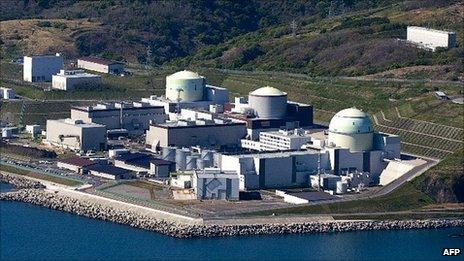UK nuclear support 'rises after Fukushima'
- Published

The poll suggests Britain could be bucking the trend on opinions about nuclear power
An opinion poll suggests that support for nuclear power in Britain has increased in the wake of the Fukushima disaster.
In the British Science Association poll, external, over 40% of respondents said the benefits outweighed the risks.
Researchers believe that worries about future energy security have become far more important in people's minds.
Men were more than twice as likely as women to be in favour of nuclear, the poll suggests.
In March 2011, a powerful earthquake and tsunami destroyed the cooling systems at the Fukushima nuclear plant in Japan. There were fears of large radiation leaks and 80,000 people were evacuated from a 20km zone around the facility.
The incident sparked a huge debate worldwide on the future of nuclear power with the German government deciding to close all their remaining nuclear power stations by 2022.
Bucking the trend
While opinion polls in Japan, Germany and Italy have all shown a drop in support for nuclear power following the disaster, Britons seem to be bucking the trend with increasing enthusiasm for the technology.
In 2010, 38% of those polled in the UK believed the benefits of nuclear outweighed the risks; this has increased to 41% today.
When asked about building new nuclear power stations, support has increased substantially from just 9% in 2005 to 23%.
In the light of the disaster, Professor Bob Cywinski, a nuclear expert from the University of Huddersfield, said the poll findings were unexpected.
"I am surprised that there is still such strong support after Fukushima despite the public misunderstanding and despite the bad publicity."
Gender gap
The poll highlights a large gender gap when it comes to nuclear and other energy sources.
Some 53% of men were in favour compared to 21% of women. Almost a third of women want future energy investment to be in solar power where a similar proportion of men favour investing in atomic energy.
Professor Nick Pidgeon from Cardiff University says that the way that men and women feel about technology may be informing their attitudes to nuclear.
"A lot of explanations have been put forward for this gender effect. A lot of it is to do with the way boys and girls are educated to think about science. Men have a more gung-ho view on what technology can do for you - women tend to be more cautious."
Climate change was often cited in the past as the main motivator for opting for nuclear. But according to Professor Pidgeon the poll suggests that this has now been overtaken by worries over energy security.
"Climate change has become less salient, it's gone off people's radar in the last four of five years and energy security has become a more important driver of preferences around energy questions."
Professor Pidgeon says that, overall, Britons may be warming to nuclear power, but their attitudes are still a little tepid.
"People in general are expressing what we've called in the past a reluctant acceptance of nuclear - if you look at the data on renewables versus nuclear there is still a strong preference for renewables but many people view that nuclear may be necessary in the short or medium term as part of the energy mix."
The British Science Association commissioned the poll from Populus, which interviewed 2,050 GB adults online between 26th and 29th August 2011.
- Published31 May 2011
- Published30 May 2011
- Published30 May 2011